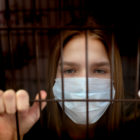
Moratorium on Juvenile Court Fees and Fines Can Ease Family Burdens During COVID-19
|
As the COVID-19 pandemic explodes into a full-blown public health and economic crisis, states around the country are beginning to recognize that now is not the time to assess and collect fees and fines in the criminal legal system. These emergency reforms are win-win: Families keep the money they need for daily survival, and criminal courts free up their time and attention to concentrate on more pressing issues.








